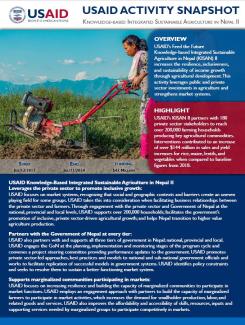START: JUL/12/2017 | END: JUL/11/2024 | FUNDING: $42 MILLION
OVERVIEW
USAID’s Feed the Future Knowledge-based Integrated Sustainable Agriculture in Nepal (KISAN) II increases the resilience, inclusiveness, and sustainability of income growth through agricultural development. This activity leverages public and private sector investments in agriculture and strengthens market systems.
HIGHLIGHT
USAID’s KISAN II partners with 180 private sector stakeholders to reach over 200,000 farming households producing key agricultural commodities. Interventions contributed to an increase of over $144 million in sales and yield increases for rice, maize, lentils, and vegetables when compared to baseline START figures from 2018.
USAID Knowledge-Based Integrated Sustainable Agriculture in Nepal II Leverages the private sector to promote inclusive growth:
USAID focuses on market systems, recognizing that social and geographic contexts and barriers create an uneven playing field for some groups. USAID takes this into consideration when facilitating business relationships between the private sector and farmers. Through engagement with the private sector and Government of Nepal at the national, provincial and local levels, USAID supports over 200,000 households; facilitates the government’s promotion of inclusive, private sector-driven agricultural growth; and helps Nepal transition to higher value agriculture production.
Partners with the Government of Nepal at every tier:
USAID also partners with and supports all three tiers of government in Nepal: national, provincial and local. USAID engages the GoN at the planning, implementation and monitoring stages of the program cycle and convenes a project steering committee providing performance updates to the government. USAID promotes private sector-led approaches, best practices and models to national and sub-national government officials and works to facilitate replication of successful models in government systems. USAID identifies policy constraints and seeks to resolve them to sustain a better functioning market system.
Supports marginalized communities participating in markets:
USAID focuses on increasing resilience and building the capacity of marginalized communities to participate in market functions. USAID employs an engagement approach with partners to build the capacity of marginalized farmers to participate in market activities, which increases the demand for smallholder production, labor, and related goods and services. USAID also improves the affordability and accessibility of skills, resources, inputs and supporting services needed by marginalized groups to participate competitively in markets.


